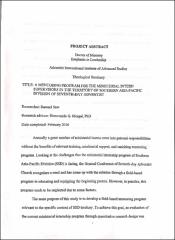| dc.description.abstract | Annually a great number of ministerial interns enter into pastoral responsibilities
without the benefits of relevant training, ministerial support, and enriching mentoring
program. Looking at the challenges that the ministerial internship program of Southern
Asia-Pacific Division (SSD) is facing, the General Conference of Seventh-day Adventist
Church recognizes a need and has come up with the solution through a field-based
program in educating and equipping the beginning pastors. However, in practice, this
program tends to be neglected due to some factors.
The main purpose of this study is to develop a field-based mentoring program
relevant to the specific context of SSD territory. To achieve this goal, an evaluation of
the current ministerial internship program through a quantitative research design was
done. A survey was conducted to 221 pastors throughout SSD. The population sample
were Seventh-day Adventist pastors in various areas of SSD territory. Due to the vast
distribution of the pastors, convenient sampling was taken as the representative for the
general population.
The study found various strengths as well as challenges in the current ministerial
program. Among the strengths of the program is the opportunity to acquire experiential
knowledge as a practical link to the theoretical knowledge they learned in the seminary.
On the other hand, several challenges were found such as lack of structur~, detached
field-based experience, and loose mentoring components. This study also found out that
there is a need to establish a curriculum-based program integrated with biblical and
mentoring principles.
Based on the findings and recommendations, a field-based ministerial internship
mentoring program (MIMP) was developed. The MIMP program is founded on the
biblical concept of mentoring from both the Old and New Testaments. The 9 mentoring
principles were also taken as governing principles in the implementation of the program.
The MIMP follows a program structure, training schedule for mentor-pastors, and implementing strategies. The program followed the basic template: rationale of the
program, objectives, biblical and theoretical basis, structure, training format,
sustainability, and evaluation. The program incorporates all the significant findings of
the study in the form of the MIMP. | en_US |

